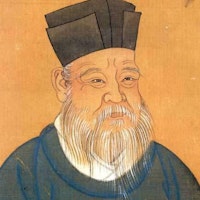The principle of Tao is just as close as what is right in front of our eyes, in our everyday lives, in eating and drinking, and in the maintaining of normal social relationships…
The principle of Tao is just as close as what is right in front of our eyes, in our everyday lives, in eating and drinking, and in the maintaining of normal social relationships…
Zhu Xi

The Principle of Tao
Topic: Truth, Law, & Principle
The principle of Tao is just as close as what is right in front of our eyes, in our everyday lives, in eating and drinking, and in the maintaining of normal social relationships―between ruler and subject, and father and son, and between brothers, and spouses, and friends.
Zhu Xi (born October 18, 1130, in Youxi, Fujian Province, China – died April 23, 1200, in Chunan, Zhejiang Province, China) was one of the most influential philosophers, teachers, and scholars of the Song dynasty. A leading figure in Neo-Confucianism, Zhu Xi sought to renew and deepen the moral and metaphysical teachings of Confucius and Mencius, integrating them with Buddhist and Daoist insights into a unified vision of human nature and the cosmos. His early education was guided by his father and local scholars, and by his teenage years, Zhu Xi had already gained a reputation for intellectual rigor and moral seriousness. He passed the highest level of the imperial examinations at age nineteen, marking the beginning of a life devoted to scholarship and service.
Throughout his career, Zhu Xi combined official responsibilities with an enduring commitment to teaching and contemplation. He established academies where students engaged not only in study but in moral cultivation and community life. His reinterpretation of the Four Books—the Analects, Mencius, Great Learning, and Doctrine of the Mean—became the foundation for civil service education in China for centuries. Zhu Xi emphasized li (principle) as the underlying order of the universe and qi (vital energy) as its material expression, teaching that true wisdom comes through quiet reflection and disciplined self-cultivation. His method of “investigating things” (gewu) invited students to seek harmony between inner clarity and the natural world.
Zhu Xi’s influence extended far beyond his lifetime. Though his ideas were initially contested, his commentaries eventually shaped the moral and intellectual life of East Asia, profoundly influencing Korean, Japanese, and Vietnamese traditions as well. He is remembered not only as a philosopher but as a moral exemplar—humble in spirit, devoted to learning, and grounded in the conviction that truth must be lived, not merely known. Zhu Xi’s vision of harmony between principle and practice continues to inspire reflection on how human beings may cultivate virtue and align with the deeper order of the universe.
Zhu, Xi. Further Reflections on Things at Hand: Chu Hsi, a Reader, P. 69 [Translated by Allen John. Wittenborn, University Press of America, 1991].

Zhu Xi
Theme: Eternal Truth

The Essence of Tao [73. Master Chu said:]
Resources
Related Quotes
Copyright © 2017 – 2026 LuminaryQuotes.com About Us